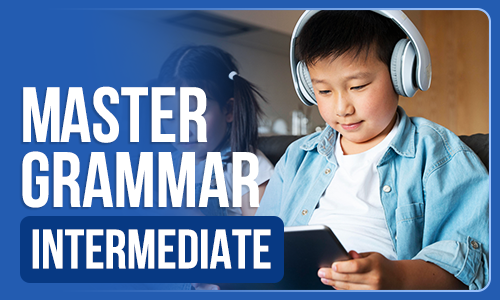Master Grammar Intermediate là tài liệu luyện tập Ngữ pháp được The Ivy-League Vietnam thiết kế đặc biệt dành cho những học viên đang có dự định ôn tập và thi PET. Tài khoản này sẽ cung cấp nhiều tài liệu luyện tập đa dạng về Ngữ pháp giúp học viên làm quen và sử dụng thành thạo cấu trúc và nội dung ngữ pháp của đề thi PET. Mỗi bài tập đều được thiết kế khoa học và hợp lí, tạo cơ hội cho các bạn học viên có thể dễ dàng đánh giá trình độ của bản thân và xác định được những phần cần luyện tập và cải thiện.x
LƯU Ý ĐỐI Ý KHÓA HỌC
1. Học viên sử dụng trình duyệt Chrome (kể cả iOS, MacOS)
2. Học sinh sẽ phải hoàn thành các nội dung học theo thứ tự của tài khoản (KHÔNG ĐƯỢC BỎ QUA BÀI HỌC):
- Đối với file bài giảng: xem xong nhấn nút hoàn thành
- Đối với Video: học sinh KHÔNG ĐƯỢC TUA VIDEO (phải nghe từ đầu đến cuối video). Trong trường hợp không nghe hết video hệ thống không ghi nhận hoàn thành bài học
- Đối với bài luyện tập: học sinh sẽ chỉ tính hoàn thành bài kiểm tra nếu điểm kiểm tra cao hơn hoặc bằng điểm đạt tối thiểu. Điểm đạt của hệ thống sẽ từ 70%-90% tùy từng bài.
LINK: Buổi hướng dẫn học tài khoản Master Grammar ngày 15/1/2024
https://m.facebook.com/story.php?story_fbid=1082902726243533&id=816419477&mibextid=9R9pXO
Một trong những yếu tố quan trọng khi ôn thi chứng chỉ PET cụ thể là Ngữ pháp B1 chính là phải có tài liệu ôn tập. Với sự phát triển mạnh mẽ của công nghệ 4.0, nên việc tra cứu tài liệu ôn thi cũng không còn khó khăn. Chính vì vậy, The Ivy-League Vietnam xin được gửi tới quý học viên và các bậc phụ huynh tài khoản tự học tựa đề Master Grammar Intermediate.
Đối với tài khoản này, các bạn học viên có thể:
- Tự do về thời gian cũng như địa điểm làm bài
- Highlight, đánh dấu, note lại những mục cần nhớ của bài tập
- The Ivy-League Vietnam sẽ có hệ thống chấm bài tự động và đáp án cho học viên đối chiếu kết quả.
76 Bài học - 4 giờ 16 phút
37 Bài học - 1 giờ 38 phút
41 Bài học - 35 phút
31 Bài học - 0 phút
38 Bài học - 8 phút
27 Bài học - 22 phút
9 Bài học - 0 phút
17 Bài học - 0 phút
30 Bài học - 0 phút
20 Bài học - 42 phút
14 Bài học - 1 giờ 15 phút
19 Bài học - 38 phút
17 Bài học - 0 phút
14 Bài học - 0 phút
44 Bài học - 0 phút
32 Bài học - 0 phút

thay rat la hay du ca
Rất hay, học hiệu quả, giảng viên tốt 👍.
khóa học này thực sự bổ ích
rất hay hay hay hay hay
bài học rất hay
con cảm ơn thầy
Very interesting and quality!!!
Chờ mãi mà bên trung tâm k up video bài giảng, chỉ là bài trang giấy của cuốn Grammar in use. K đúng như lời hứa ban đầu. THực sự thất vọng vì k giữ đúng chữ tín.
hhhhhhhhhhhhhhhhhhhhhhhhhhhhhhhhhhhhhhhhhhhhhhhhhhhhhhhhhhhhhhhhh